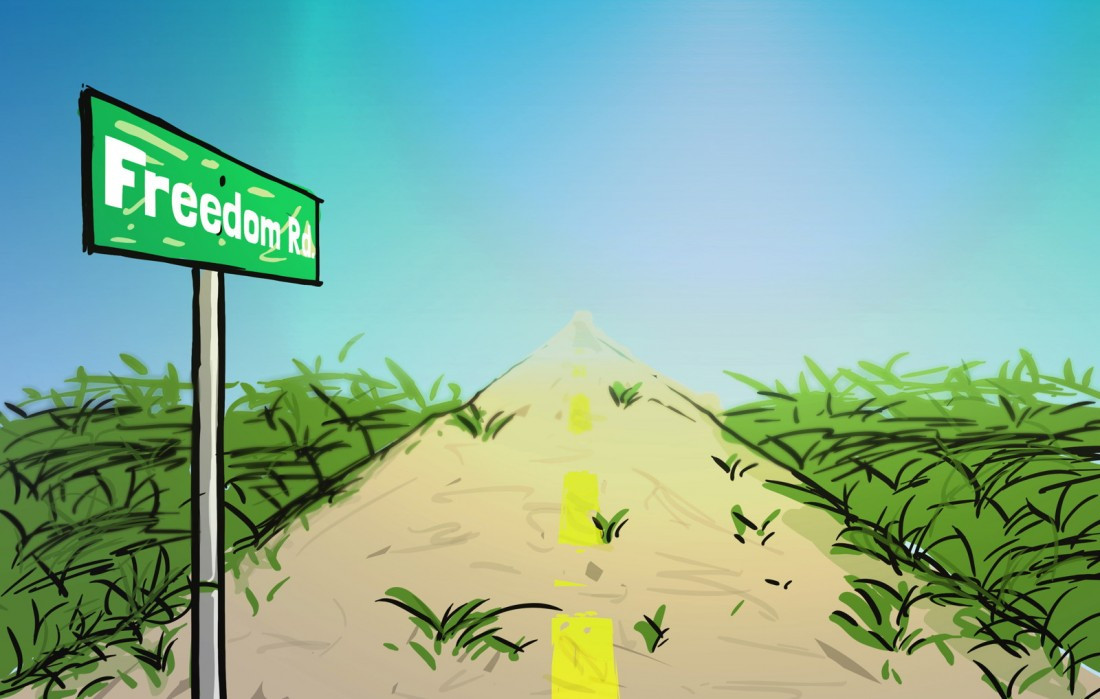Fighting for freedom
Shoal Lake #40 community shares stories at U of W
Voices in solidarity with the Ojibwa community of Shoal Lake #40 converged at a panel discussing the plight of the First Nations community at the University of Winnipeg (U of W) on Nov. 5.
Funds to build Freedom Road – an all-season road to the marooned island community near the Manitoba-Ontario border about 155 kilometres east of Winnipeg – have been promised by all three levels of government. Most recently, the Liberal government promised to fund the federal portion of Freedom Road during the pre-election campaign period.
The public panel, held at the U of W’s Bulman Student Centre, was organized by the group Friends of Shoal Lake 40.
They invited members of the Shoal Lake community, including Daryl Redsky and Cuyler Cotton, to come share their stories.
Information about Shoal Lake #40 “is in the hands of people of power,” Redsky says. He feels like “an adult living under a curfew,” because the barge that takes him home stops running at midnight. Redsky mentioned around 9 p.m. that’d he’d have to leave soon to drive back to his community after the event.
Coun. Cindy Gilroy (Daniel McIntyre) was one of seven city councillors who visited the reserve on Oct. 30, along with some staff and students. She spoke about her impressions of the trip and how she gleaned a clearer understanding of the poor living conditions at Shoal Lake #40.
“I did not know this was happening,” Gilroy says.
Samantha Klassen, a member of Students for Freedom Road who visited Shoal Lake #40 with the city council delegation, reflected on the reserve’s ongoing struggle.
“(The road) is a practical and necessary infrastructure for the community, but it is also becoming a symbol for reconciliation,” Klassen says.
Cotton, who sat on the panel as the Media Relations representative, is also in charge of conducting trips to the band’s Museum of Canadian Human Rights Violations. The museum displays the unfulfilled promises the community has been made, with newspaper clippings, letters and other artifacts.
Cotton provided background about the conflict between the City of Winnipeg, the federal government and the indigenous community that’s been going on since 1919.
In 1919, the federal government took a portion of band land and left the band territory separated in three disconnected parts, pushing the people of #40 into a peninsula. Then, the city built a diversion dike across the peninsula, leaving the First Nation marooned in a human-made island and living under awful conditions.
The City of Winnipeg gets its clean drinking water from Shoal Lake, but the community itself has lived under a boil water advisory for the last 17 years.
Friends of Shoal Lake 40 recently launched a petition on buildfreedomroad.com, which had reached 3,876 signatures as of this writing. The group is concerned the mayor will go back on the city’s commitment to pay for a third of the $30 million cost of Freedom Road and want to see the $10 million set aside in the city budget. The provincial government has also agreed to fund a third of the total construction costs.
Although Shoal Lake #40 has plans to send a delegation to Geneva, Switzerland in February to present their case to a United Nations committee on economic, social and cultural rights, members of Churches For Freedom Road, another advocacy group supporting Shoal Lake #40, think the construction of Freedom Road is just around the corner.
Redsky says that he does not want his children to live with what he has gone through and he does not want to leave this burden on them.
“I am the last generation to deal with this issue,” he says.
Published in Volume 70, Number 10 of The Uniter (November 12, 2015)







